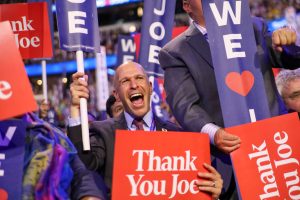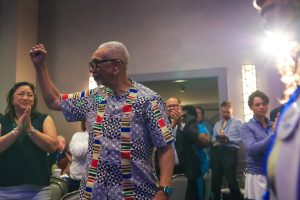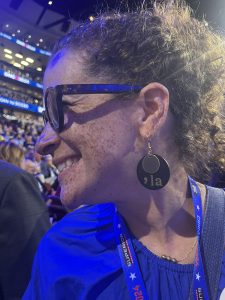Longtime Harris supporters do victory lap
By Hannah Meisel Capitol News Illinois — September 4, 2024
Captions: State Rep. Bob Morgan, D-Deerfield, shouts during a speech by President Joe Biden at the Democratic National Convention. Morgan was an early Kamala Harris supporter in 2019. (Photo by Andrew Adams/Capitol News Illinois)
CHICAGO — On a cold morning in late 2019, state Sen. Mattie Hunter, D-Chicago, boarded a bus bound for Iowa to knock on doors for then-U.S. Sen. Kamala Harris in her bid for the presidency.
At one particular door — one of many she visited in “mostly white middle-class communities” – Hunter met a couple with mixed political allegiances. While the wife was excited about Harris, the husband expressed he was a Trump supporter.
“The man was like, blocking the door and then his wife was in the background jumping up on her tiptoes saying, ‘Kamala, Kamala!’” Hunter said, recalling that the woman whispered the candidate’s name. “It was the funniest thing. And then when they closed the door, you could hear them arguing, having a verbal discussion.”
Hunter, who’s spent more than two decades representing neighborhoods on the South Side of Chicago in the General Assembly, was one of 15 Democratic officials named to Harris’ “Illinois Leadership Council” in 2019, eight months into the then-U.S. senator’s presidential campaign. U.S. Rep. Bobby Rush, D-Chicago, had already been tapped as Harris’ Illinois campaign chair.
Before then, Hunter had only met Harris once, at the 2008 Democratic National Convention in Denver, when Harris was in her second term as district attorney of San Francisco. The two didn’t stay in contact, but Hunter said she “watched her quietly” as Harris was elected attorney general of California and eventually the state’s first Black U.S. senator.
“I just knew then that she was going somewhere, and I wanted to be a part of helping her become successful,” Hunter said, citing Harris’ approach to speaking to people with “no phoniness, no B.S.” Plus, she noted, Harris’ membership in Alpha Kappa Alpha, a major Black sorority that boasts lifelong involvement from many of its members, made them sisters.
But Hunter’s involvement with Harris’ 2019 campaign was ultimately short-lived; Harris pulled the plug on her candidacy in December of that year before the first votes were cast in the 2020 primary election cycle.

U.S. Rep. Bobby Rush, D-Chicago, appears at an Illinois delegation breakfast during the Democratic National Convention in Chicago. Rush was the Illinois chair for Kamala Harris’ run for president in 2019. (Photo by Andrew Adams/Capitol News Illinois)
Five years later, Hunter last week watched as her party chose Harris as its first Black woman nominee for president of the United States at the Democratic National Convention in Chicago — the same city where Harold Washington’s 1983 campaign for mayor sparked a political hopefulness in Hunter that she hadn’t felt since — until now.
“This is how I felt back in ’83 when Harold was running,” Hunter said of Harris’ candidacy. “This is exactly what I felt.”
Hunter and other “OGs for Harris” who supported the vice president in 2019 reunited for a celebratory brunch last week outside of official DNC programming.
Among Harris’ early supporters in 2019 were state Sen. Ram Villivalam, D-Chicago, and state Rep. Bob Morgan, D-Deerfield, who were both freshman state legislators when the Harris campaign’s Illinois council tapped them to help with outreach to South Asian and Jewish voters, respectively.
Villivalam, both the first Asian and first Indian American member of the Illinois Senate, emphasized that his support for Harris stemmed from “the body of her work” and not just because of her ethnic background as half Indian. But Villivalam said he also believes Harris’ personal story of being raised by her immigrant mother will resonate with many voters — particularly Asian Americans.
“I strongly believe the Asian American community will be activated because of who she is, because of what she stands for, and what she represents,” he said. “That common thread of coming to this country with the minimum amount in your pocket, making minimum wage, working your way up … to the middle class — that’s something that people can relate to. That’s something that people understand.”

State Rep. Mary Beth Canty, D-Arlington Heights, shows off her “comma-la” earrings — a nod to the phenetic pronunciation of “Kamala” — on the DNC floor in Chicago. (Photo by Hannah Meisel/Capitol News Illinois)
Since the Oct. 7 Hamas terror attacks on Israel, Morgan has been extremely vocal about his support for the Jewish state and has been pleased about Harris’ commitments to Israel. In her Thursday (Aug. 22) evening acceptance speech, Harris called for both the release of Israeli hostages and a ceasefire in Gaza, navigating a topic that had led to several pro-Palestinian protests outside of the DNC.
But Morgan also worked with Harris after the July 4, 2022, mass shooting at the Highland Park Independence Day parade. Morgan, who went on to become a lead sponsor of Illinois’ 2023 assault weapons ban, said he was impressed by Harris’ compassion for the victims and survivors of mass shootings that preceded Highland Park — and those that didn’t make the news.
“I’d been a supporter of Kamala Harris before but to see the way the vice president personally spent a lot of her energy and time around that initiative inspired me and so many people who’ve been impacted by gun violence,” Morgan said of Harris’ role overseeing the White House Office of Gun Violence Prevention that was created last year.
Highland Park Mayor Nancy Rotering was also a member of Harris’ 2019 Illinois council.
The group was put together by Valerie Alexander, the former chief of staff to Illinois’ senior U.S. Sen. Dick Durbin. It also included U.S. Rep. Danny Davis, D-Chicago, and Nikki Budzinski, who now represents Illinois’ 13th District in Congress but at the time was a senior adviser to Gov. J.B. Pritzker.
Budzinski said she was recruited to help with slating downstate delegates for the campaign and recalled being impressed with Harris’ history as a prosecutor and that she’d won three statewide elections in California.
Mike Kreloff, a longtime Democratic election attorney who in 2019 helped ensure Harris’ campaign collected the necessary signatures to get on the ballot in Illinois, said Harris’ current rise wasn’t something he saw coming five years ago.
Kreloff had been prepared to support U.S. Sen. Amy Klobuchar of Minnesota in the race, but he said that in the time it took for a consultant helping with her campaign to get back to him, he’d been recruited to Harris’ race by a young Democratic operative.
As someone who describes himself as a “party guy,” Kreloff said he’d had some misgivings about the way Harris “came out hard” at Joe Biden, who’d eventually emerge as the Democratic nominee and be elected president in November 2020 with Harris as his running mate.
But over the next four years as vice president, Kreloff said he — and Democrats in general — have been able to see Harris in a new light.
“It’s incredible — I don’t think she’s missed a step,” he said before mentioning Minnesota Gov. Tim Walz’s praise of Harris’ “joy” at their first joint rally as running mates earlier this month. “Having organized campaigns for over 50 years … people need to be inspired. People need to feel joy that they’re doing something good for their community.”
On the convention floor last week wearing a Harris-themed purse and earrings featuring a comma and the letters “la” — a nod to the phonetic pronunciation of “Kamala,” state Rep. Mary Beth Canty, D-Arlington Heights, echoed Kreloff’s assertion.
“I feel like people got to know her and the joy that she has and the sincerity that she has as a human being, the things that she cares about — without having that weight and that mantle of being president,” she said of Harris’ four years as vice president.
Canty had barely entered politics when Harris announced her first presidential campaign in early 2019, having just filed paperwork to run for local village board just days before. But she said she’d followed Harris’ career for a while and was inspired by both her background and her “spark.”
“I’m a halfie just like her, right? I’m a biracial woman … and I saw her as somebody that was so strong and so powerful and so happy, and people really gave her a hard time for that, even then,” Canty said. “I get accused of that all the time. I mean, look at me today: I’m wearing glitter sneakers to the DNC, right? But what people fail to recognize is that that’s also comfort. I’m very practical. You can have joy and be practical. You can be tough and be kind.”
DNC organizers and Harris’ campaign played up that dichotomy last week, interspersing speeches with highly produced videos meant to showcase parts of the vice president’s resume and personality. Many of the videos contained clips from Harris’ time on the Senate Judiciary Committee in which she grilled witnesses or Trump’s nominees to cabinet posts or the U.S. Supreme Court.
Some clips have gone viral in recent weeks, but they’re not new to Yasmeen Bankole, a delegate and trustee on the Hanover Park Village Board. Bankole has spent nearly five years working in Durbin’s Chicago office, and got to know Harris’ work through her boss, who’s long served on judiciary committee and currently chairs it.
“For the people that are still getting to know Kamala, please remember that she’s been our vice president for the past four years,” she said on the crowded convention floor Thursday evening, hours before Harris took the stage. “And in the past four years, we’ve had one of the most productive administrations that we’ve ever seen.”
Reflecting on seeing a Black woman accept her party’s nomination for president, Bankole said it means “anything is possible.”
“I’m so grateful to be alive during this period of time so that I can witness this,” she said.
hmeisel@capitolnewsillinois.com
Capitol News Illinois is a nonprofit, nonpartisan news service covering state government. It is distributed to hundreds of newspapers, radio and TV stations statewide. It is funded primarily by the Illinois Press Foundation and the Robert R. McCormick Foundation, along with major contributions from the Illinois Broadcasters Foundation and Southern Illinois Editorial Association.







